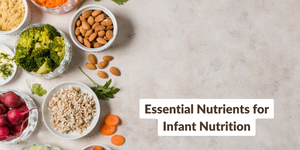Bacteria, viruses, and yeasts are present everywhere, including inside our bodies. Bacteria are generally viewed as bad and disease-causing, but not all of them are harmful—some are "good" bacteria. While bad bacteria makes us sick, good bacteria actually contributes to a healthy body. However, both good and bad bacteria naturally live in our bodies. Let us guide you through what probiotics are, how they are beneficial, and whether probiotics for kids are safe.
What are probiotics?
Probiotics are products with live good bacteria that improve the levels of good bacteria in the body and benefit health. Probiotic products are now available for kids as formula, chewable tablets, and powders that can be mixed into food. They are beneficial for your health and are different from the harmful bacteria that cause infection. Your body hosts a healthy balance of good and bad bacteria, mainly in the gut. When bad bacteria outnumber the good bacteria, the balance is disrupted, and you fall sick. Probiotics decrease the number of bad bacteria, restore the balance in your body and make you feel better. They also produce by-products called "postbiotics", which regulate the immune system. Probiotics naturally occur in fermented foods and are also available as dietary supplements.
Are they safe for children?
Probiotics for kids are generally safe for healthy babies and children. However, make sure to talk to your paediatrician before including probiotic-rich foods in your child’s diet or giving them any probiotic supplements.
Serious infections have been reported in some children who received probiotic supplements. Therefore, probiotics should not be given to children with the following conditions:
- A serious or long-term illness unless recommended by a paediatrician.
- Ill preterm babies.
- Children with weak immunity.
- After a recent surgery.
- Kids who have indwelling medical devices (like a tube inserted in a vein).
What are the benefits of probiotics?
Probiotics for kids benefits are:
- Probiotics help improve immune function, promote the digestion of food and absorption of nutrients, produce vitamins, and protect against infection.
- They may be given to children who are on antibiotics, as these destroy good bacteria along with the harmful ones and often cause diarrhoea as a side effect.
- Probiotics help to control inflammation.
- Probiotics produce chemicals called postbiotics that regulate the digestive and immune systems, helping the body function better.
How to give probiotics to my child?
Several probiotic preparations specially designed for kids are available in stores as drinks, chewable tablets, or powders. Two specific types of bacteria, Lactobacillus and Bifidobacterium, and a yeast, Saccharomyces boulardii, are commonly present in probiotic supplements. However, these probiotics have different effects, and research is still on to determine which probiotic is best in which conditions, at what doses, and when to take it. Therefore, you must consult your doctor before giving your child any probiotic product.
It is safer to give probiotics to children through foods in their daily diet rather than as supplements. Breast milk also contains small amounts of probiotics. Parents can give their kids fermented foods such as curd, sour cream, and cottage cheese that contain various probiotics.
You can easily include curd in your kid’s diet, either in the main meals or as a midday snack. You can also give your child buttermilk, another example of a natural probiotic. Non-dairy sources of probiotics include idli, dosa, pickled cucumbers, and fermented cabbage (sauerkraut). However, some fermented foods may not appeal to kids due to their strong smell and taste.
A well-balanced diet with a variety of probiotic-rich foods helps to maintain the good bacteria at their normal levels. Although probiotics for kids are generally well tolerated in healthy children, it is important to talk to a paediatrician before giving any probiotic supplement to your kid.
Looking for more information on infant development and growth? Look no farther than the BabyG App and get complete access to 1000+ Development Activities, Milestones and Growth Reports, Meal Plans, Recipes, Bedtime Stories, Tips and a global Community of likeminded parents.






LEAVE A COMMENT